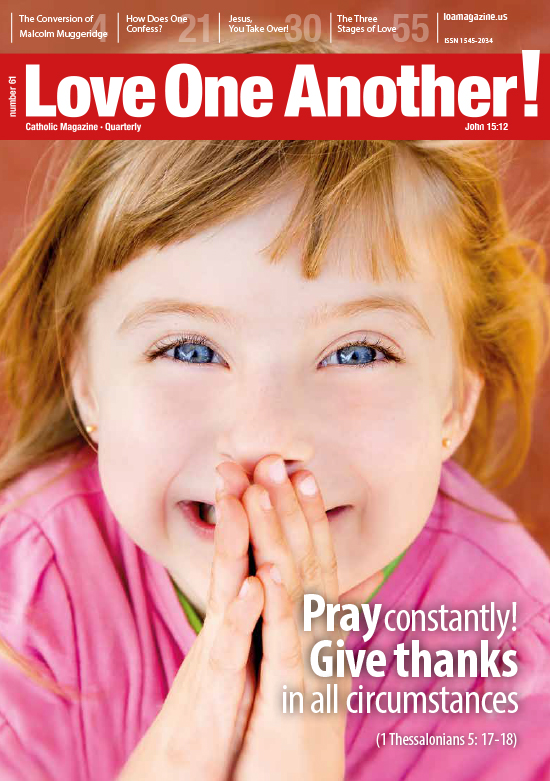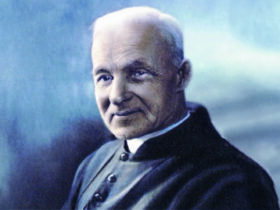Marriage as an institution was designed by God at the moment of the creation of man. Jesus Christ raised it to the dignity of a sacrament. Marriage is meant to reflect the essence of the Triune God, who is inseparable Unity, which is why the Lord Jesus says: “Therefore what God has joined together, let no one separate.” (Mark 10:9)
God, in creating man in his own image and likeness (Gen. 1:27), created man and woman and gave them the ability to forge lasting, unbreakable bonds of marital love. Faithfulness was written into marriage, because it is an inherent characteristic of God: “For the Lord is good; his steadfast love endures forever, and his faithfulness to all generations” (Ps. 100:5). God revealed himself to Moses as “a God merciful and gracious, slow to anger, and abounding in steadfast love and faithfulness” (Exod. 34:6). God fulfilled in Jesus Christ all the promises given to mankind from the very beginning and showed us the greatest possible love, giving His life in the person of the Son of God as an atonement for our sins.
By keeping their marriage vows, spouses testify to the faithfulness of God, who fulfils His promises and offers people love and salvation. When people turn away from God, faithfulness begins to disturb them. Prophet Jeremiah talks about this: “This is the nation that did not obey the voice of the Lord their God, and did not accept discipline; truth has perished; it is cut off from their lips” (Jer. 7:28). “There is no faithfulness or loyalty, and no knowledge of God in the land”, regrets the prophet Hosea (Hos. 4:1).
Therefore, Jesus Christ speaks of undying faithful marital love as being the only possible way to achieve marital happiness. Divorce is a human idea of how to avoid problems, “but from the beginning it was not so” (Matt. 19:8). Only abiding in unity, continuous mutual forgiveness and reconciliation, despite the difficulties, leads to the full realisation of God’s intention, which is to be happy. “Whoever divorces his wife and marries another commits adultery against her; and if she divorces her husband and marries another, she commits adultery”, such is the teaching of Jesus (Mark 10:11–12), who instituted the sacrament of marriage and who in marriage gives the spouses the power to build love also in situations of the greatest crisis.
This teaching was continued by St Paul, who said: “A wife is bound as long as her husband lives” (1 Cor. 7:39). And to make sure no one had any doubts and thought that these were his own ideas, the apostle says: “To the married I give this command – not I but the Lord – that the wife should not separate from her husband (but if she does separate, let her remain unmarried or else be reconciled to her husband), and that the husband should not divorce his wife” (1 Cor. 7:10–11). Reconciliation is the best solution to marital crisis, but if it is not possible, we should remain in purity and faithfulness to the sacrament. For centuries, the Church has confirmed and passed on this truth, encouraging spouses to persevere in holiness and marital purity and in faithfulness.
Cardinal Gerhard Ludwig Müller, Prefect of the Congregation for the Doctrine of the Faith, put it this way: “Familiaris Consortio is not an invention of Pope John Paul II. This document is consistent with the whole development of the dogma, the declarations of the Church, the Council of Florence and the Council of Trent, the declarations of the popes in recent centuries, when the Church opposed the secularisation of marriage. It started even before the French Revolution and went further with the establishment of the civil marriage as opposite to the sacramental marriage. It is not time now to give in to the secularisation of marriage. We want to sanctify marriage. This is the true Gospel with regard to marriage” (quoted in The Catholic Guide, Polish edition, 13 (5 April 2015)).
From the beginning, God the Father instituted marriage as an indissoluble union between man and woman, God the Son redeemed mankind and established the Church as the bride to whom He is always faithful, and the Holy Spirit sanctifies spouses and enables them to extend forgiveness and true love. If this is so, then marital faithfulness should have unquestionable value for us, and keeping it should be a matter of the highest priority in crisis situations.
Miroslaw Rucki
With all the problems and crises that arise in marriage, spouses should come to Jesus, who is truly present in their sacrament of marriage. By virtue of this sacrament, Jesus always obliges spouses, especially in situations of greatest marital crisis, to remain faithful to their marriage vows, to forgive one another, to observe the Commandments and to do His will. Then He will be able to heal the spouses’ hearts with his almighty love and to restore and heal their relationship. In situations of great crisis in marriage, when your spouse has left or became involved with another person, the Lord Jesus wants to save your marriage, so He invites you to the Movement of Faithful Hearts (MFH). For God, no situation is hopeless. You just have to accept this and let Jesus work in your life. How? Every day, give Him your heart for His healing in prayer and intercede for the grace of conversion for your spouse.
What do you agree to when you join the community of the Movement of Faithful Hearts? 1. To live in a state of grace, which means a commitment to confess immediate after committing a mortal sin. 2. If possible, daily Eucharist, adoration of the Blessed Sacrament, praying the rosary and reading the Scriptures. 3. To daily entrust to Christ yourself and your spouse in the prayer of entrustment of the MFH.
To join the Movement of Faithful Hearts, you need to go to confession, receive Holy Communion and wholeheartedly entrust to Jesus yourself and your spouse in the prayer of entrustment of the MFH.
Don’t be afraid to openly oppose demoralisation, breaking up our families and harming our children! Do not agree to the divorce mentality. Encourage others to join the MFH and to persevere in faithfulness to the marriage vows, despite separation or civil divorce. We ask you to notify our editorial team of your joining the MFH, so we can send you a special blessing and write your name down in the Book of Faithful Hearts. Pray the prayer of entrustment of the MFH daily and live out the obligations it contains. We in the editorial team and all the members of the MFH embrace you with our daily prayer and at the same time we ask you to remember us in your prayers.
Fr Mieczysław Piotrowski and the editorial team
Do you like the content published on our website?
Support us!






